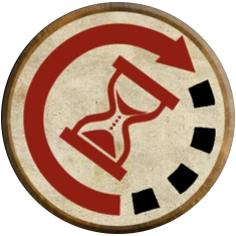Elf
Attribute Limits:- Graceful: When rolling directly against Dexterity, treat the test as Favored (page 109). Unskilled tests based on Dexterity don’t count, only those that directly call for a Dexterity test, such as reducing falling damage, interrupting a foe while Waiting
 , or gaining position in a foot chase
, or gaining position in a foot chase - Darkvision: Elves ignore up to four points of darkness penalties (see page 122)
- Magical Affinity: Elves are born and bred of magic and suffer without it. Any time an elf is in a realm with a Magic Axiom less than 12, any Fatigue result causes an extra point of
 . For example, an elf wearing plate mail in a low-magic zone would suffer four
. For example, an elf wearing plate mail in a low-magic zone would suffer four  if a Fatigue result came up on the Conflict Line (see page 112): one extra due to the special property of the armor and another thanks to Magical Affinity.
if a Fatigue result came up on the Conflict Line (see page 112): one extra due to the special property of the armor and another thanks to Magical Affinity.
The elves were once one of the mightiest bulwarks against the dark forces of Aysle. Then Uthorion’s rampage put many of their great alabaster cities to ruin, or burned to cinders the mighty forests that once supported their incredible treetop villages. After years of bloody fighting, the elven nations were reduced to a quarter of their original population.
Just as the Dark One was about to press for their final destruction, he ceased his attacks. Some wonder if this fortuitous timing was brought about by the fair folk—or was just a fortunate coincidence.
A handful of elves felt compelled to aid the inhabitants of this strange new world. Some do it for honor, some because they believe the salvation of their people may lie somewhere on this backward world Uthorion seems to prize more highly than their own.
The elves’ numbers on Earth are few, but their skill, power, and knowledge of the Dark One’s ways is invaluable.
High Elves & Wood Elves
High elves from the cities tend to wear light-colored clothing—pure white or scintillating red are common, often lined with silver or gold braid. They are often haughty and arrogant to others, seeing humans as short-lived creatures with little understanding of the greater cosmos and dwarves as little more than a step above goblins and other creatures of the earth.
Wood elves hail from the treetop cities. Their clothing reflects their environment, typically shades of green or brown but with occasional flourishes of bright red, yellow, magenta or other colors of nature.
Elven Rangers hail almost exclusively from the wood elves, but act as a mostly independent force of roving scouts and protectors.
After Uthorion’s attack on Earth, many came across the maelstrom bridge to aid humanity. They are strangely resentful toward the leaders of their home world. Some have even openly speculated that the elves somehow convinced Uthorion to attack Earth before their own cities were destroyed.
Ayslish elves live up to 1 000 years. Some take the view that lesser races (those with life spans of a mere 100 years or less) are tools to be used for the greater good. Others see their roles as shepherds of these unfortunate and short-lived children.